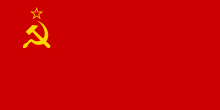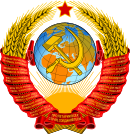Советский народ | |
|---|---|
 | |
 Map of the country's constituent Union Republics in 1989 | |
| Total population | |
| 286,730,819 (1989 census) | |
| Languages | |
| Russian,[1] Ukrainian, Belarusian, Kazakh, Azerbaijani, Georgian, Armenian, Uzbek, Kyrgyz, Tajik, Turkmen, Latvian, Estonian, Romanian, Lithuanian, others (see: Languages of the Soviet Union) | |
| Religion | |
| Christianity, Islam, Judaism, Buddhism, Atheism, others (see: Religion in the Soviet Union) | |
| Related ethnic groups | |
| Citizens of the post-Soviet states |
| Part of a series on the |
| Culture of the Soviet Union |
|---|
 |
| People |
| Languages |
| Traditions |
| Cuisine |
| Festivals |
| Literature |
| Music |
| Sport |
The Soviet people (Russian: сове́тский наро́д, romanized: sovetsky narod) were the citizens and nationals of the Soviet Union. This demonym was presented in the ideology of the country as the "new historical unity of peoples of different nationalities" (новая историческая общность людей различных национальностей).[2]
- ^ "Language Policy in the former Soviet Union". H. Schiffman. University of Pennsylvania. 19 November 2002.
- ^ Great Soviet Encyclopedia, article "Советский народ" by Suren Kaltakhchian